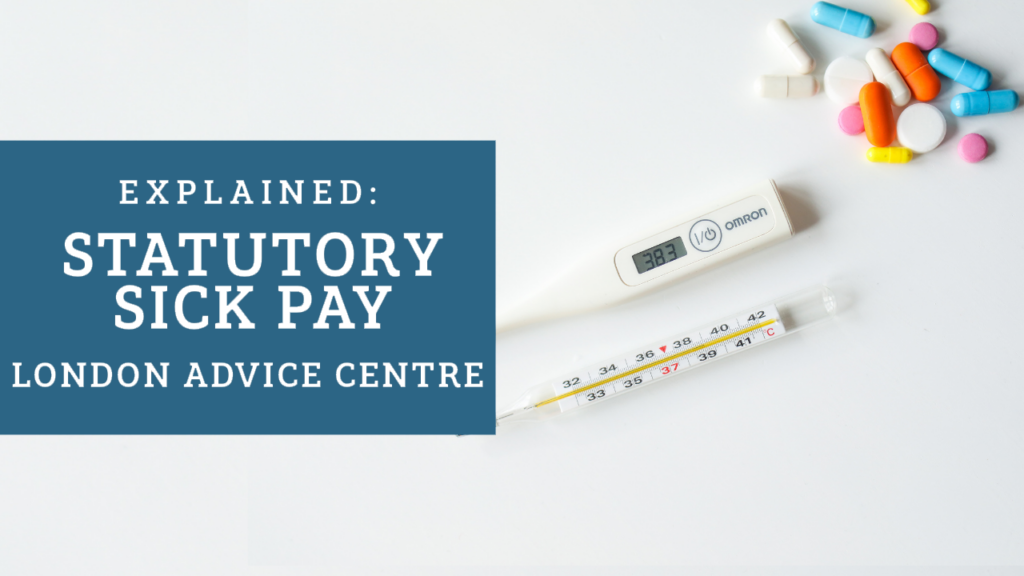
Statutory Sick Pay (SSP) is a benefit available for those are too ill to work; it can be claimed for up to 28 weeks and you become eligible after being too sick to work for 4 full days. If you work (and are not self-employed) you are entitled to SSP once sick.
Eligibility
- Work for an employer and be in regular work (you cannot claim if you are self-employed)
- Must be sick for at least 4 full days (including non-working days)
- You must earn at least £120 (before tax) per week
- Not fall into an ineligible category:
- Self employed
- Already claimed SSP for 28 weeks and reapplied with 8 weeks of that last claim
- Are receiving other benefits such as Employment and Support Allowance (ESA) or Statutory Maternity Pay/Allowance
- You’re pregnant (have a pregnancy related illness or a due date within 4 weeks) or, had a baby in the past 14 weeks. All dependent on whether it is a pregnancy related illness or not, please refer to gov.uk for further details.
- Are an agricultural worker (different rules apply, see below)
- You are in the armed forces
Other eligibility details
If you work a zero hour contract you might still be able to get sick pay. Ensure you look over your contract and ask your employer for more information. If they refuse, request a reason why in writing and consult your local advice centre. Agency workers are also entitled to SSP until your contract ends. But, if you get sick between contracts (when you’re out of work) you won’t be entitled but you may be able to claim other benefits to support you such as Universal Credit (UC). If you feel you have been treated unfairly during this process you can take action. Contact London Advice Centre for your personalised consultation to discuss your options.
If you’re not entitled to sick pay there may be other benefits you can claim to help support you. You may be able to apply for Universal Credit (UC), or Personal Independence Payment (PIP) if you have a long-term illness. If in doubt, contact your local advisory service for more information and a better understanding of what you could be entitled to.
We understand that employment terms can vary greatly. We recommend you seek professional advice if you need guidance through this process.
Payment
SSP entitles you to 28 weeks of sick pay at £96.35 per week; this is paid by your employer (not the government). You may get a higher rate if your company has a sick pay scheme. It’s always best to check your employment contract first.
It’s paid to you the way you would normally receive your wages (usually to a bank account or building society). SSP will also be taxed and National Insurance deducted.
If you have more than 1 employer you could be entitled to SSP from both, likewise if you can only do one of your jobs then you can receive normal wags from that one and SSP form the other.
How to claim
You must tell your employer within 7 days of being unable to work (unless they have a separate company policy on SSP in which case you must follow their guidelines).
If you are unable to work due to sickness for more than 7 days you will have to provide your employer with a fit note (sick note). This can be provided for you by your healthcare professional.
You must follow the guidelines and procedures set out by your employer/company. Although you will always be entitled to Statutory Sick Pay you may not be able to get any further pay from your employer and your contract may be terminated if you do not follow their guidelines.
Coronavirus (COVID-19)
If you have been told to self-isolate because of COVID-19, you will be eligible for SSP every day you not working (but could have been). This includes:
- someone who you live with or in your support bubble has COVID-19 symptoms or has tested positive
- if the NHS has notified you to self-isolate as you’ve been in contact with one who has tested positive for COVID-19
- you’ve been advised by a healthcare professional to self-isolate for your health and safety (e.g., before a going into hospital)
You will still be eligible for SSP if you are on furlough.
You may need to provide an isolation note from the NHS, accessible online from NHS 111, or the notification alone may be enough proof. A letter confirming the date of a hospital procedure will also serve as sufficient evidence.
Note: you are not eligible for SSP if you are self-isolating after returning to the country.
Agricultural Sick Pay (ASP)
ASP works slightly differently to Statutory Sick Pay as you will be paid the Agricultural Minimum Wage (dependant on your Grade 1-6 and how much you work i.e., part-time or full time and how much that equates to) which will include any SP you are entitled to. You can only claim this if you were employed before 1st October 2013 (before the rules changed) and your contract states so.
Essentially, what you’ll get is based on the amount of time you were in employment before you needed to take time off. For further information please refer to gov.uk and Agricultural workers’ rights – GOV.UK (www.gov.uk)
Please note: this post was written in line with guidance at the time of publishing. For the most up-to-date guidelines please refer to gov.uk